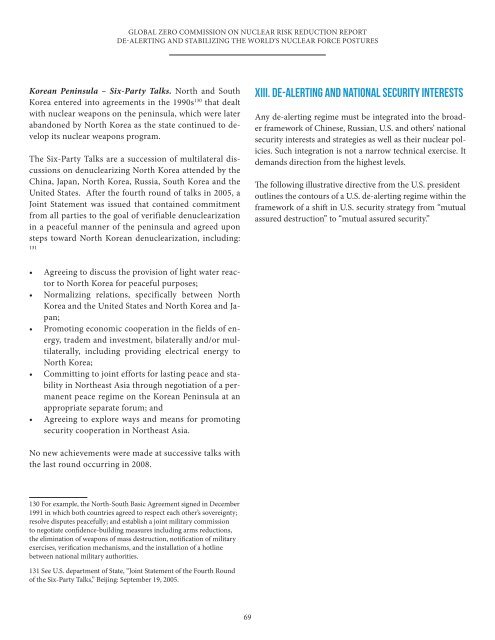GLOBAL ZERO COMMISSION ON NUCLEAR RISK REDUCTION REPORTDE-ALERTING AND STABILIZING THE WORLD’S NUCLEAR FORCE POSTURESand engage in bilateral discussi<strong>on</strong> <strong>on</strong> disarmament andn<strong>on</strong>-proliferati<strong>on</strong>. 126The details of the Lahore Declarati<strong>on</strong> were left in limboas fighting over Kargil so<strong>on</strong> broke out. The declarati<strong>on</strong>served as the basis for further dialogue between the twocountries <strong>on</strong> various bilateral matters, including talks <strong>on</strong>the <strong>nuclear</strong> <strong>risk</strong>-reducing CBMs noted above. However,these talks have been intermittent and not been veryfruitful. The talks resumed in 2011 after the 2008 Mumbaiattacks. They have largely been handled by mid-levelofficials. One obstacle is that while India believes <strong>nuclear</strong>CBMs should be kept separate from c<strong>on</strong>venti<strong>on</strong>al CBMs,Pakistan views these strands as intertwined.Some experts suggest revitalizing the talks with visits byheads of state and getting the Internati<strong>on</strong>al Atomic EnergyAgency involved as a trusted facilitator in normalizingsecurity relati<strong>on</strong>s between India and Pakistan. 127 Mostrecently, India cancelled a meeting between their foreignministers scheduled for August 2014 after Pakistani officialsmet with the Hurriyat movement (a n<strong>on</strong>-governmentalpolitical fr<strong>on</strong>t calling for Kashmiri independence),which India viewed as Pakistani meddling in India’s internalaffairs.South Asia – Ottawa Dialogue and De-Alerting. The OttawaDialogue involves talks <strong>on</strong> South Asian <strong>nuclear</strong> issuesbetween senior retired officials and academics fromIndia and Pakistan. This forum recently recommended aseries of steps to improve strategic stability in the regi<strong>on</strong>,calling <strong>on</strong> the two sides to:• Maintain their unilateral moratorium <strong>on</strong> <strong>nuclear</strong> explosivetesting;• Maintain their <strong>nuclear</strong> weap<strong>on</strong>s in a de-mated,de-alerted and n<strong>on</strong>-deployed status;• Renounce strikes against each other’s nati<strong>on</strong>al commandauthorities;• Renounce destabilizing military doctrines;• Agree to further mechanisms to prevent inadvertent<strong>nuclear</strong> escalati<strong>on</strong>, including further CBMs (e.g., establishin each country a strategic <strong>risk</strong> managementunit);• Further strengthen the safety and security of their<strong>nuclear</strong> warheads and fissile material during storage,transportati<strong>on</strong> and handling; and• Reassure the other that stable command and c<strong>on</strong>trolsystems will be maintained especially in light ofchanging and advancing technologies. 128Middle East – Arms C<strong>on</strong>trol and Regi<strong>on</strong>al Security. TheArms C<strong>on</strong>trol and Regi<strong>on</strong>al Security (ACRS) workinggroup was set up to work to apply c<strong>on</strong>fidence-buildingmeasures to the Middle East and broadly discuss a <strong>nuclear</strong>weap<strong>on</strong>s- or weap<strong>on</strong>s of mass destructi<strong>on</strong>-free z<strong>on</strong>e.A wide gap between Israeli and Arab priorities <strong>on</strong> armsc<strong>on</strong>trol emerged. Israel insisted that the first steps towardarms c<strong>on</strong>trol and de<strong>nuclear</strong>izati<strong>on</strong> c<strong>on</strong>sist of transparencyCBMs, while Egypt suggested that all parties in the regi<strong>on</strong>first sign existing <strong>nuclear</strong>, chemical, and biological weap<strong>on</strong>streaties and allow internati<strong>on</strong>al inspecti<strong>on</strong>s. Furtherdisagreements centered <strong>on</strong> Israel’s lack of c<strong>on</strong>fidence inIAEA safeguards provided under the NPT insistence up<strong>on</strong>a tight and complementary regi<strong>on</strong>al verificati<strong>on</strong> regime.C<strong>on</strong>versely, Egypt maintains that the existing IAEA regimeis sufficient. 129ACRS talks ended in 1995. Middle East nati<strong>on</strong>s have heldtalks <strong>on</strong> establishing a <strong>nuclear</strong> weap<strong>on</strong>s-free z<strong>on</strong>e, but thesetalks have been hampered by the same issues as well as Israelireluctance in using the NPT regime for the process.126 “Lahore Declarati<strong>on</strong>,” signed February 21, 1999, (posted by UnitedStates Institute for Peace, Feb 23, 1999), http://cns.miis.edu/inventory/pdfs/aptlahore.pdf.127 Rachel Oswald, “U.S. Sees Need for New Approach in Pakistan-IndiaNuclear Talks,” Global Security Newswire, Nuclear Threat Initiative,Aug 2, 2012, http://www.nti.org/gsn/article/us-sees-need-new-approachpakistan-india-<strong>nuclear</strong>-talks/.128 “Elements of Strategic Stability in South Asia,” Ottawa Dialoguemeeting, Oct 8, 2013, https://app.box.com/s/g45q2r9xdrdh9sflcv44129 Holly Higgins, “Applying C<strong>on</strong>fidence-Building Measures in aRegi<strong>on</strong>al C<strong>on</strong>text,” paper presented at the Building Nuclear C<strong>on</strong>fidence<strong>on</strong> the Korean Peninsula workshop of the Institute for Science and Internati<strong>on</strong>alSecurity, Washingt<strong>on</strong>, D.C., July 23-24, 2001. http://isis-<strong>on</strong>line.org/uploads/c<strong>on</strong>ferences/documents/higginspaper.pdf68
GLOBAL ZERO COMMISSION ON NUCLEAR RISK REDUCTION REPORTDE-ALERTING AND STABILIZING THE WORLD’S NUCLEAR FORCE POSTURESKorean Peninsula – Six-Party Talks. North and SouthKorea entered into agreements in the 1990s 130 that dealtwith <strong>nuclear</strong> weap<strong>on</strong>s <strong>on</strong> the peninsula, which were lateraband<strong>on</strong>ed by North Korea as the state c<strong>on</strong>tinued to developits <strong>nuclear</strong> weap<strong>on</strong>s program.The Six-Party Talks are a successi<strong>on</strong> of multilateral discussi<strong>on</strong>s<strong>on</strong> de<strong>nuclear</strong>izing North Korea attended by theChina, Japan, North Korea, Russia, South Korea and theUnited States. After the fourth round of talks in 2005, aJoint Statement was issued that c<strong>on</strong>tained commitmentfrom all parties to the goal of verifiable de<strong>nuclear</strong>izati<strong>on</strong>in a peaceful manner of the peninsula and agreed up<strong>on</strong>steps toward North Korean de<strong>nuclear</strong>izati<strong>on</strong>, including:131XIII. DE-ALERTING AND NATIONAL SECURITY INTERESTSAny de-alerting regime must be integrated into the broaderframework of Chinese, Russian, U.S. and others’ nati<strong>on</strong>alsecurity interests and strategies as well as their <strong>nuclear</strong> policies.Such integrati<strong>on</strong> is not a narrow technical exercise. Itdemands directi<strong>on</strong> from the highest levels.The following illustrative directive from the U.S. presidentoutlines the c<strong>on</strong>tours of a U.S. de-alerting regime within theframework of a shift in U.S. security strategy from “mutualassured destructi<strong>on</strong>” to “mutual assured security.”• Agreeing to discuss the provisi<strong>on</strong> of light water reactorto North Korea for peaceful purposes;• Normalizing relati<strong>on</strong>s, specifically between NorthKorea and the United States and North Korea and Japan;• Promoting ec<strong>on</strong>omic cooperati<strong>on</strong> in the fields of energy,tradem and investment, bilaterally and/or multilaterally,including providing electrical energy toNorth Korea;• Committing to joint efforts for lasting peace and stabilityin Northeast Asia through negotiati<strong>on</strong> of a permanentpeace regime <strong>on</strong> the Korean Peninsula at anappropriate separate forum; and• Agreeing to explore ways and means for promotingsecurity cooperati<strong>on</strong> in Northeast Asia.No new achievements were made at successive talks withthe last round occurring in 2008.130 For example, the North-South Basic Agreement signed in December1991 in which both countries agreed to respect each other’s sovereignty;resolve disputes peacefully; and establish a joint military <str<strong>on</strong>g>commissi<strong>on</strong></str<strong>on</strong>g>to negotiate c<strong>on</strong>fidence-building measures including arms reducti<strong>on</strong>s,the eliminati<strong>on</strong> of weap<strong>on</strong>s of mass destructi<strong>on</strong>, notificati<strong>on</strong> of militaryexercises, verificati<strong>on</strong> mechanisms, and the installati<strong>on</strong> of a hotlinebetween nati<strong>on</strong>al military authorities.131 See U.S. department of State, “Joint Statement of the Fourth Roundof the Six-Party Talks,” Beijing: September 19, 2005.69


